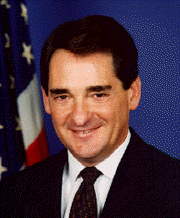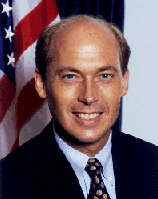
Rep. Tauzin
Tauzin and Burns Re-Introduce Bills to Reform E-Rate
(May 12, 1999) Rep. Billy Tauzin and Sen. Conrad Burns re-introduced legislation that would reform the Federal Communications Commission's schools and libraries program, which is also known as the "e-rate" and the "Gore Tax". Their bills would end FCC control of the program, fund the program for five years out of the existing excise tax on phones, and distribute the money in the form of block grants to the states.
Related Documents |
| Rep. Tauzin Press Release,
5/11/99. Rep. Weller Press Release, 5/11/99. Sen. Burns Press Release, 5/11/99. |
TLJ Summaries |
| E-Rate Bills in the 106th Congress. E-Rate Bills in the 105th Congress. |
Rep. Billy Tauzin (R-LA) introduced the "Schools and Libraries Internet Access Act" in the House on Tuesday, May 11. Rep. Jerry Weller (R-IL) and Rep. Tom Tancredo (R-CO), two of the cosponsors of the bill, joined Rep. Tauzin at a press conference Tuesday morning outside the Capitol Building to announce and promote the bill. Sen. Conrad Burns (R-MT), who is sponsoring the companion bill in the Senate, also attended.
The sponsors stated that they support providing federal assistance to schools and libraries to connect to the Internet. For example, Sen. Burns stated: "We believe in this program. And we believe it should be funded. We believe it should be funded legally."
However, they do not want the program to be paid for by phone users. And, they do not want the Federal Communications Commission to hand out the subsidies.
Background On the E-Rate |
| The Congress codified the Federal Communications Commission's
longstanding practice of providing universal service support for telecommunications
services for high cost rural and low income areas in Section
254 of the Telecommunications Act of 1996. The section also instructed the FCC to
extend universal service support to schools, libraries, and rural health care clinics. Many Congressmen thought the FCC exceeded its authority under Section 254 when it implemented the schools and libraries program. The FCC, in a Report dated May 7, 1997, extended subsidies to schools and libraries, not only for telecommunications services, but also for Internet access and internal connections, computer networking, network servers, and server software. The FCC decided in May of 1997 to fund the program at the rate of $2.25 Billion dollars per year. The FCC collects the funds from phone companies, who in turn collect it from their customers. Hence, many argue that the program involves a tax. And since Vice President Al Gore is a major proponent of the program, and has claimed credit for it, opponents sometimes call the program the "Gore Tax." The program is administered by the FCC and the Schools and Libraries Division (SLD) of the Universal Service Administrative Company (USAC), a company controlled by the FCC. |
These nearly identical bills would reform the program for providing subsidies to schools, libraries and rural hospitals. Currently, the Federal Communications Commission, in conjunction its Universal Service Administrative Company, runs the program. Funding comes from money collected by the FCC from telephone companies, who in turn charge their customers, thus raising phone bills.
These two bills would continue financial support for Internet access, but change the process by which the subsidies are made. The administration of the program would be transferred from the Federal Communications Commission. Rep. Tauzin and Rep. Weller stated that their bill would hand over administration to the Department of Education, which would distribute money in the form of block grants to the states.
However, Sen. Burns' statement summarizing the Senate version of the bill indicates that the National Telecommunications and Information Administration (NTIA) at the Department of Commerce would administer the program, and distribute the block grants to the states.
Ken Johnson, a staff assistant to Rep. Tauzin, told Tech Law Journal that the two bills are identical, except as to which federal agency would administer the program. He also stated that the House bill is the same as the version introduced in the 105th Congress, except that the administering agency has been changed from NTIA to the Department of Education.
Under both bills, universal service funding under Section 254 of the Telecom Act would be terminated; instead the program would be funded at about $1.9 Billion per year for five years out of the existing excise tax on phones. Revenues raised by the excise tax on phones currrently go into the general fund. The excise tax, which raises over $5 Billion per year, would be partly phased out by this proposal. After five years, it would be terminated.
 |
|
Rep. Tauzin |
"In a nutshell, what we're doing is cutting taxes for nearly everyone in America and providing a stable source of funding for the E-rate program in the process," Rep. Tauzin said. "In my opinion, the so-called 'Gore tax' on telephone bills which funds the current program is not constitutional. If critics successfully challenge this program in court, there will be no money, not a single penny, available for Internet services for schools and libraries. This bill guarantees funding for these vitally important educational services."
Rep. Tauzin was asked by a member of the press why he called the schools and libraries program the "Gore Tax." Rep. Tauzin responded that "it is a tax inspired by Vice President Gore through the FCC."
Rep. Tauzin described his proposal as a "win win" solution. It would phase out the excise tax on phone, which impacts all phone users. And, it would provide a stable source of funding for the e-rate for five years.
Rep. Tauzin also elaborated that his bill would not end the FCC's authority to provide for "discounted rates of service." It would, however, prevent the FCC from funding "capital construction."
Rep. Tauzin also discussed, and was questioned by the press about, the prospects for passage of the bill. He stated that he is working with the Republican leadership to have it made a part of a larger tax relief package. He also stated that "there is a lot of interest in it ... we have talked to Archer."
Rep. Bill Archer (R-TX) is Chairman of the House Ways and Means Committee. Rep. Tauzin also said that he was counting on Rep. Weller, who is a member of the Ways and Means Committee, to work with that committee.
 |
|
Rep. Weller |
"Only Congress can levy taxes," said Rep. Weller.
"Currently the FCC's tax to finance this important program is being challenged in court," said Rep. Weller. "We need to replace this illegal FCC tax and pass a legal and reasonable funding solution to keep this program working. There is no reason to create or sustain the FCC's new tax."
Rep. Weller continued: "Our bill will save federal assistance to schools and libraries seeking the wire and fiber to provide Internet access for school kids. In addition our legislation will save phone consumers as much as $19 billion in taxes over the next five years. This legislation is helping to accomplish our goal of upgrading technology in our schools so every Illinois child has access to computers and the Internet!"
Rep. Weller also elaborated on why the Department of Education should handle the program. He stated that the FCC is a "rate regulatory utility," and not an agency with expertise in education. He said that this bill "puts the program where it belongs. And that is with the Department of Education."
 |
|
Sen. Burns |
The sponsor of the Senate version of the bill, Sen. Conrad Burns (R-MT), represents a state where the population is widely dispersed, telecommunications costs are high, and universal service has been important in making telephone service widely available. "The Schools and Libraries program is extremely important for schools that cannot afford the initial costs of connecting to the Internet, which has become an invaluable educational tool," Sen. Burns said. "I want to see this program reach its full potential for success, and the best way to do that is provide a stable structure that is not the subject to the FCC's whims."
"This bill ensures the continued viability of the Schools and Libraries program by tying it to a specific, predictable funding mechanism. The bill also makes sure that universal service is saved for its original objective - providing affordable telephone service for folks in rural areas."
The House bill is sponsored by Rep. Tauzin. The chief co-sponsor is Rep. Weller. Hence, it is referred to by some as the "Tauzin-Weller bill." Rep. Tauzin stated that other supporters include John Shimkus (R-IL), Vito Fossella (R-NY), Rick Boucher (D-VA), Tom Tancredo (R-CO), Porter Goss (R-FL), Gary Miller (R-CA), John Sununu (R-NH) and Ed Whitfield (R-KY).
Rep. Tancredo was also present at Tuesday's press conference. Earlier this year he introduced a bill to abolish the e-rate. HR 692, the "E-Rate Termination Act," would simply have removed from Section 254 the language upon which the FCC based its schools and libraries program.
Related Stories |
| E-Rate Termination Bill Filed in House, 2/17/99. E-Rate Funds Disbursement to Begin, 11/25/98. E-Rate Divide Follows Partisan Lines, 8/10/98. House Committee Debates E-Rate Funding, 8/5/98. Riley Attacks Tauzin-Burns Proposal, 7/30/98. Comparison of E-Rate Programs, 7/27/98. Tauzin-Burns E-Rate Reform Bill, 7/24/98. Senate Hearing on SLC, 7/20/98. Wm. Kennard Speech on E-Rate, 7/15/98. Gingrich Criticizes SLC, 7/1/98. E-Rate Debate Continues, 6/22/98. FCC Modifies E-Rate, 6/15/98. Senate Subcommittee Berates FCC, 6/11/98. SLC in Trouble on Hill, 6/8/98. E-Rate Defenders Fight Back, 6/8/98. Clinton Condemns "Digital Divide", 6/8/98. Riley Waits in Wings to Run E-Rate, 6/8/98. Debate Over "Gore Tax" Heats Up, 6/5/98. AT&T's Universal Service Charges, 5/28/98. FCC Reports to Congress on SLC, 5/11/98. Congress Decries FCC, 3/31/98. GAO Reports SLC Is Illegal, 3/31/98. |